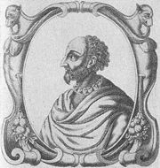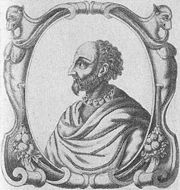
Académie de Poésie et de Musique
Encyclopedia
The Académie de Poésie et de Musique, later re-named the Académie du Palais, was the first Academy in France. It was founded in 1570 under the auspices of Charles IX of France
by the poet Jean-Antoine de Baïf
and the musician Joachim Thibault de Courville
.
 The purpose of the Académie was to revive Classical
The purpose of the Académie was to revive Classical
Greek
and Roman
poetry and music. It met regularly at Baïf's house in Paris
, and had two classes of members — "musicians", or poets, singers and instrumentalists; and "auditors", or subscribers who helped support the academy financially. Baïf's intention was to revitalise and transform French poetry
by applying the ancient metres
(vers mesurés à l'antique) to it, and combining it with simple music following ancient metres (musique mesurée à l'antique
).
Although the ostensible purpose of the Académie was musico-poetic, Baïf's goals were much more ambitious – he hoped that through a structuring of French poetry, he might bring about a more structured social order and morality. This goal followed from Neo-Platonic
ideals, where music and morality are closely linked. To this end, discussions were not limited to music and poetry, but also included discussions of Natural philosophy
, mathematics, and other subjects. Baïf was influenced at least in part by the Accademia Platonica of Marsilio Ficino
in Florence
. Other influences on the creation of the Académie were the teacher and poet Jean Daurat
, Pierre de Ronsard
, and other members of La Pléiade
, a literary group.
Despite Baïf's goals of spreading his philosophy, the Académie kept the art of measured poetry and music a secret.
In order to help further his goals, Baïf enlisted the help of French musicians, the most influential of whom was Claude Le Jeune
. Le Jeune's experiments influenced musical setting of French poetry, including the use of irregular metres in the air de cour
, for several generations, despite the influence of the academy itself being much shorter in duration. Other musicians involved included Eustache du Caurroy
and Jacques Mauduit
.
When Charles IX died, the Académie became far less active. It had a renaissance for a short time under Henry III of France
when it met in the Louvre
under the name Académie du Palais. At this time Guy du Faur de Pibrac took over, and the focus of the group shifted to oratory
and debate.
Charles IX of France
Charles IX was King of France, ruling from 1560 until his death. His reign was dominated by the Wars of Religion. He is best known as king at the time of the St. Bartholomew's Day Massacre.-Childhood:...
by the poet Jean-Antoine de Baïf
Jean-Antoine de Baïf
Jean Antoine de Baïf was a French poet and member of the Pléiade.-Life:He was born in Venice, the natural son of the scholar Lazare de Baïf, who was at that time French ambassador at Venice...
and the musician Joachim Thibault de Courville
Joachim Thibault de Courville
Joachim Thibault de Courville was a French composer, singer, lutenist, and player of the lyre, of the late Renaissance. He was a close associate of poet Jean Antoine de Baïf, and with Baïf was the co-founder of the Académie de Poésie et de Musique, which attempted to re-create the storied ethical...
.

Classical antiquity
Classical antiquity is a broad term for a long period of cultural history centered on the Mediterranean Sea, comprising the interlocking civilizations of ancient Greece and ancient Rome, collectively known as the Greco-Roman world...
Greek
Ancient Greece
Ancient Greece is a civilization belonging to a period of Greek history that lasted from the Archaic period of the 8th to 6th centuries BC to the end of antiquity. Immediately following this period was the beginning of the Early Middle Ages and the Byzantine era. Included in Ancient Greece is the...
and Roman
Ancient Rome
Ancient Rome was a thriving civilization that grew on the Italian Peninsula as early as the 8th century BC. Located along the Mediterranean Sea and centered on the city of Rome, it expanded to one of the largest empires in the ancient world....
poetry and music. It met regularly at Baïf's house in Paris
Paris
Paris is the capital and largest city in France, situated on the river Seine, in northern France, at the heart of the Île-de-France region...
, and had two classes of members — "musicians", or poets, singers and instrumentalists; and "auditors", or subscribers who helped support the academy financially. Baïf's intention was to revitalise and transform French poetry
French poetry
French poetry is a category of French literature. It may include Francophone poetry composed outside France and poetry written in other languages of France.-French prosody and poetics:...
by applying the ancient metres
Meter (poetry)
In poetry, metre is the basic rhythmic structure of a verse or lines in verse. Many traditional verse forms prescribe a specific verse metre, or a certain set of metres alternating in a particular order. The study of metres and forms of versification is known as prosody...
(vers mesurés à l'antique) to it, and combining it with simple music following ancient metres (musique mesurée à l'antique
Musique mesurée
Musique mesurée, or Musique mesurée à l'antique, was a style of vocal musical composition in France in the late 16th century. In musique mesurée, longer syllables in the French language were set to longer note values, and shorter syllables to shorter, in a homophonic texture but in a situation of...
).
Although the ostensible purpose of the Académie was musico-poetic, Baïf's goals were much more ambitious – he hoped that through a structuring of French poetry, he might bring about a more structured social order and morality. This goal followed from Neo-Platonic
Neoplatonism
Neoplatonism , is the modern term for a school of religious and mystical philosophy that took shape in the 3rd century AD, based on the teachings of Plato and earlier Platonists, with its earliest contributor believed to be Plotinus, and his teacher Ammonius Saccas...
ideals, where music and morality are closely linked. To this end, discussions were not limited to music and poetry, but also included discussions of Natural philosophy
Natural philosophy
Natural philosophy or the philosophy of nature , is a term applied to the study of nature and the physical universe that was dominant before the development of modern science...
, mathematics, and other subjects. Baïf was influenced at least in part by the Accademia Platonica of Marsilio Ficino
Marsilio Ficino
Marsilio Ficino was one of the most influential humanist philosophers of the early Italian Renaissance, an astrologer, a reviver of Neoplatonism who was in touch with every major academic thinker and writer of his day, and the first translator of Plato's complete extant works into Latin...
in Florence
Florence
Florence is the capital city of the Italian region of Tuscany and of the province of Florence. It is the most populous city in Tuscany, with approximately 370,000 inhabitants, expanding to over 1.5 million in the metropolitan area....
. Other influences on the creation of the Académie were the teacher and poet Jean Daurat
Jean Daurat
Jean Daurat was a French poet, scholar, and a member of a group known as The Pléiade.-Early life:...
, Pierre de Ronsard
Pierre de Ronsard
Pierre de Ronsard was a French poet and "prince of poets" .-Early life:...
, and other members of La Pléiade
La Pléiade
The Pléiade is the name given to a group of 16th-century French Renaissance poets whose principal members were Pierre de Ronsard, Joachim du Bellay and Jean-Antoine de Baïf. The name was a reference to another literary group, the original Alexandrian Pleiad of seven Alexandrian poets and...
, a literary group.
Despite Baïf's goals of spreading his philosophy, the Académie kept the art of measured poetry and music a secret.
In order to help further his goals, Baïf enlisted the help of French musicians, the most influential of whom was Claude Le Jeune
Claude Le Jeune
Claude Le Jeune was a Franco-Flemish composer of the late Renaissance. He was the primary representative of the musical movement known as musique mesurée, and a significant composer of the "Parisian" chanson, the predominant secular form in France in the latter half of the 16th century...
. Le Jeune's experiments influenced musical setting of French poetry, including the use of irregular metres in the air de cour
Air de cour
The Air de cour was a popular type of secular vocal music in France in the very late Renaissance and early Baroque period, from about 1570 until around 1650...
, for several generations, despite the influence of the academy itself being much shorter in duration. Other musicians involved included Eustache du Caurroy
Eustache Du Caurroy
Eustache du Caurroy was a French composer of the late Renaissance. He was a prominent composer of both secular and sacred music at the end of the Renaissance, including musique mesurée, and he was also influential on the foundation of the French school of organ music as exemplified in the work of...
and Jacques Mauduit
Jacques Mauduit
Jacques Mauduit was a French composer of the late Renaissance. He was one of the most innovative French composers of the late 16th century, combining voices and instruments in new ways, and importing some of the grand polychoral style of the Venetian School from Italy; he also composed a famous...
.
When Charles IX died, the Académie became far less active. It had a renaissance for a short time under Henry III of France
Henry III of France
Henry III was King of France from 1574 to 1589. As Henry of Valois, he was the first elected monarch of the Polish-Lithuanian Commonwealth with the dual titles of King of Poland and Grand Duke of Lithuania from 1573 to 1575.-Childhood:Henry was born at the Royal Château de Fontainebleau,...
when it met in the Louvre
Louvre
The Musée du Louvre – in English, the Louvre Museum or simply the Louvre – is one of the world's largest museums, the most visited art museum in the world and a historic monument. A central landmark of Paris, it is located on the Right Bank of the Seine in the 1st arrondissement...
under the name Académie du Palais. At this time Guy du Faur de Pibrac took over, and the focus of the group shifted to oratory
Oratory
Oratory is a type of public speaking.Oratory may also refer to:* Oratory , a power metal band* Oratory , a place of worship* a religious order such as** Oratory of Saint Philip Neri ** Oratory of Jesus...
and debate.

